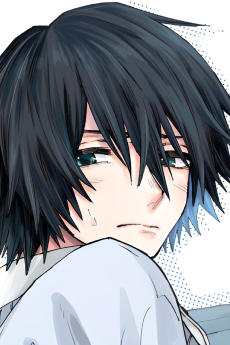
The Fragrant Flower Blooms with Dignity Hindi Subbed [08/13] | Kaoru Hana wa Rin to Saku Hindi Sub

Kaoru Hana wa Rin to Saku
The Fragrant Flower Blooms With DignitySynopsis
Chidori High is a boys’ school that takes in the dregs of society with the lowest grades. Next door stands Kikyo Girls’ High, where the wealthy, high-class families send their precious daughters. Chidori second-year Rintaro, who has a fierce face but a gentle heart, is helping at his family’s patisserie when he meets a girl named Kaoruko. The two hit it off right away…but this blissful peace is quickly disturbed when Rintaro discovers that Kaoruko is actually a student at Kikyo. Worse, she doesn’t seem to realize what a huge problem this really is! Will these two be able to forge a path for themselves, and sidestep the traps (metaphorical and literal) laid by their classmates? (Source: Kodansha USA)
Watch Trailer
Characters
The Fragrant Flower Blooms with Dignity: A Subtle Masterpiece of Emotional Nuance
The Fragrant Flower Blooms with Dignity (Kaoru Hana wa Rin to Saku), a 2025 anime adaptation of Saka Mikami’s manga, is a quiet revelation in the realm of romantic storytelling. Directed by Miyuki Kuroki and brought to life by CloverWorks, this 12-episode first season sidesteps the bombast of conventional anime romance to deliver a narrative that feels like a whispered confession—delicate, deliberate, and deeply human. This review explores why Season 1 stands as a singular achievement, weaving a tapestry of understated emotion, societal commentary, and visual poetry that lingers long after the credits roll.
A Premise Rooted in Contrast
Set against the backdrop of two neighboring high schools—Chidori Public High, a rough-and-tumble institution for “delinquent” boys, and Kikyo Private Academy, an elite haven for refined girls—the series introduces an immediate tension. The schools’ rivalry, a microcosm of class and cultural divides, sets the stage for an unlikely connection between Rintaro Tsumugi, a soft-spoken giant from Chidori, and Kaoruko Waguri, a dessert-loving optimist from Kikyo. Their meeting at Rintaro’s family bakery isn’t just a plot device; it’s a collision of worlds, where preconceptions are challenged, and kindness becomes a radical act.
What makes this premise powerful isn’t the “Romeo and Juliet” framework—though parallels exist—but its refusal to lean into melodrama. The show doesn’t sensationalize the divide between the schools or caricature its characters. Instead, it uses their interactions to probe deeper questions about judgment, identity, and the courage it takes to see beyond stereotypes.
Characters That Breathe
Rintaro and Kaoruko are the heart of the series, and their chemistry is a triumph of restraint. Rintaro, often misjudged for his imposing stature and Chidori affiliation, carries a quiet vulnerability that unfolds gradually. His self-deprecating reflections, particularly in moments where he grapples with how others perceive him, are portrayed with a rawness that avoids cliché. Kaoruko, meanwhile, is no manic pixie dream girl. Her love for cakes and sunny disposition mask a thoughtful resilience, and her ability to see Rintaro’s kindness—when others see only a delinquent—grounds their bond in mutual recognition.
The supporting cast adds depth without stealing focus. Kaoruko’s friend, whose initial jealousy hints at her own insecurities, evolves in ways that feel organic, while Rintaro’s peers at Chidori reveal layers beyond their “tough guy” exteriors. Each character, no matter how minor, feels like a person with their own unspoken story, a testament to Saka Mikami’s source material and Rino Yamazaki’s deft scriptwriting.
A Visual and Emotional Symphony
CloverWorks’ animation is a standout, not for its flashiness but for its elegance. The soft color palettes—pastel blues, warm yellows, and muted pinks—mirror the story’s gentle tone, while subtle details like the glint of sunlight through a bakery window or the fleeting blush on a character’s face amplify the emotional weight of quiet moments. The character designs by Kohei Tokuoka strike a balance between shoujo aesthetics and realistic expressiveness, making every glance and gesture feel significant.
Moeki Harada’s score is equally restrained, weaving piano and string melodies that underscore the series’ introspective mood without overwhelming it. The sound design, from the clink of teacups in the bakery to the distant hum of schoolyard chatter, creates an immersive atmosphere that feels lived-in and authentic.
Themes That Resonate
At its core, The Fragrant Flower Blooms with Dignity is about the quiet power of empathy. The series doesn’t shy away from heavier themes—bullying, self-harm, and societal prejudice are addressed, particularly in moments where Rintaro faces harassment or Kaoruko navigates her school’s elitism. Yet, these elements are handled with a sensitivity that never feels exploitative. The show asks: What does it mean to truly see someone? How do we bridge divides when the world insists on keeping us apart?
Unlike many romances that rush toward grand confessions, this series savors the in-between moments—the hesitant smiles, the shared silences, the slow realization of trust. It’s a meditation on how love, platonic or romantic, grows not from dramatic gestures but from consistent, quiet acts of understanding.
A Few Minor Stumbles
No work is flawless, and Season 1 has moments where its pacing feels almost too leisurely, particularly in episodes 4 and 7, where subplots involving secondary characters slightly dilute the focus on Rintaro and Kaoruko. The final episode, while emotionally satisfying, introduces a minor plot twist that feels a touch contrived, though it doesn’t derail the narrative’s sincerity. These are small quibbles in an otherwise cohesive season.
Why It Stands Out
What sets The Fragrant Flower Blooms with Dignity apart is its commitment to authenticity over exaggeration. In a genre often defined by heightened emotions and predictable tropes, this series feels like a warm exhale. It’s not groundbreaking in its structure—fans of shoujo will recognize familiar beats—but it’s revolutionary in its execution. The romance feels earned, the characters feel real, and the world feels alive.
The series also subtly critiques societal divides without preaching. The rivalry between Chidori and Kikyo isn’t just a plot device; it’s a lens through which the show examines classism, snap judgments, and the courage it takes to defy them. This thematic depth, paired with its emotional restraint, makes Season 1 a standout in 2025’s anime landscape.
Final Verdict
The Fragrant Flower Blooms with Dignity Season 1 is a masterclass in understated storytelling. It’s a series that trusts its audience to appreciate the beauty of small moments and the weight of genuine connection. For those who crave romance that feels like a slow bloom rather than a sudden explosion, this anime is a rare gem. It’s not just a love story—it’s a reminder that dignity lies in seeing and being seen, in all our imperfect, human glory.
Rating: 9/10
Sources: Insights drawn from reviews on IMDb, Abstract AF!, and Wikipedia entries for context on the series’ production and reception.1
Download Links
Quality: FHD [1080p]
Quality: HD [720p]
Quality: SD [480p]
Quality: FHD / HD / SD
Support Our Anime Community!
Love watching the latest anime? Help us keep uploading new episodes by join telegram channel ❤️
Join Now!
















When it comes to romance anime, The Fragrant Flower Blooms with Dignity is definitely a favorite of mine
Absolutely right 👍🏻